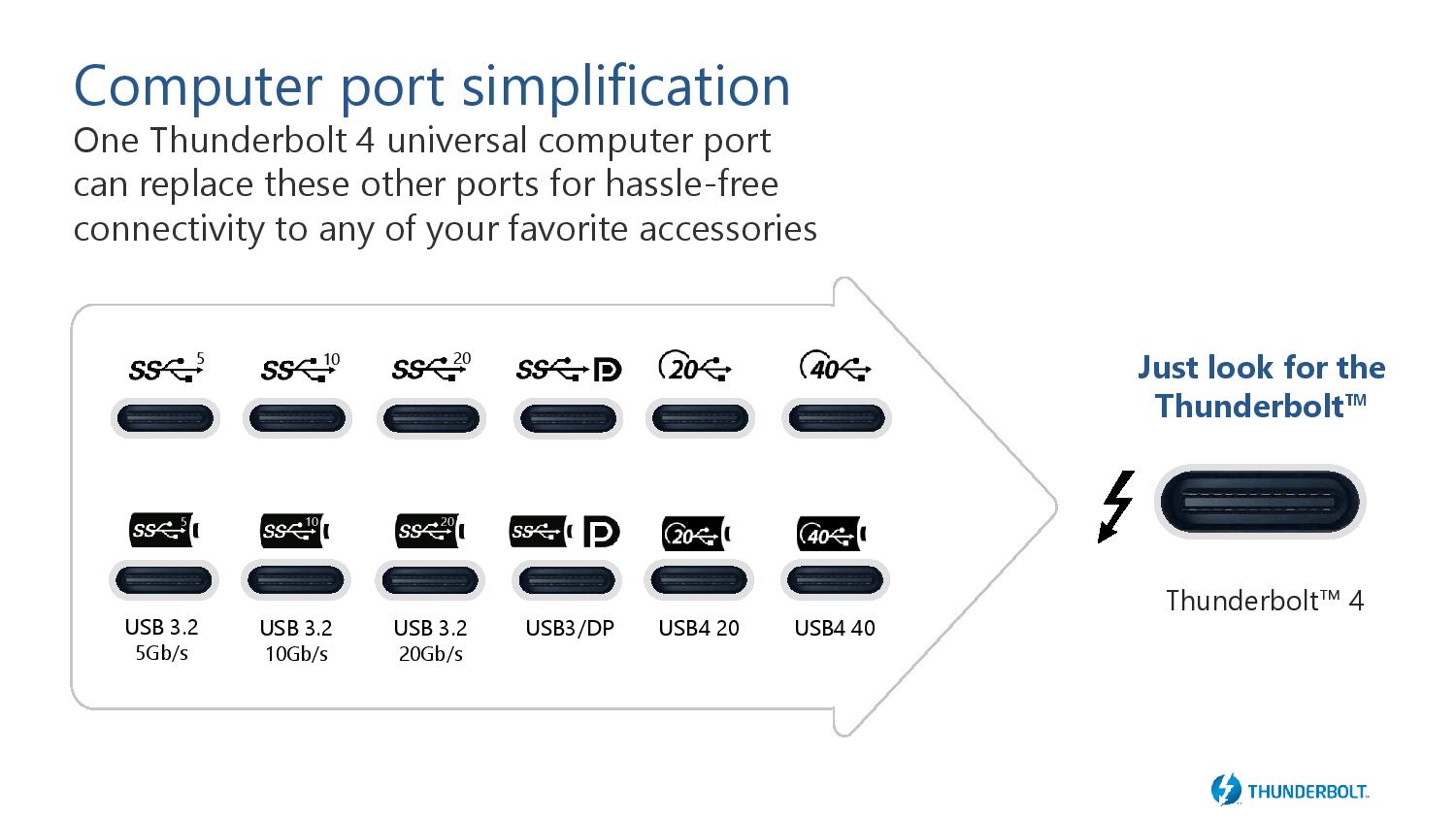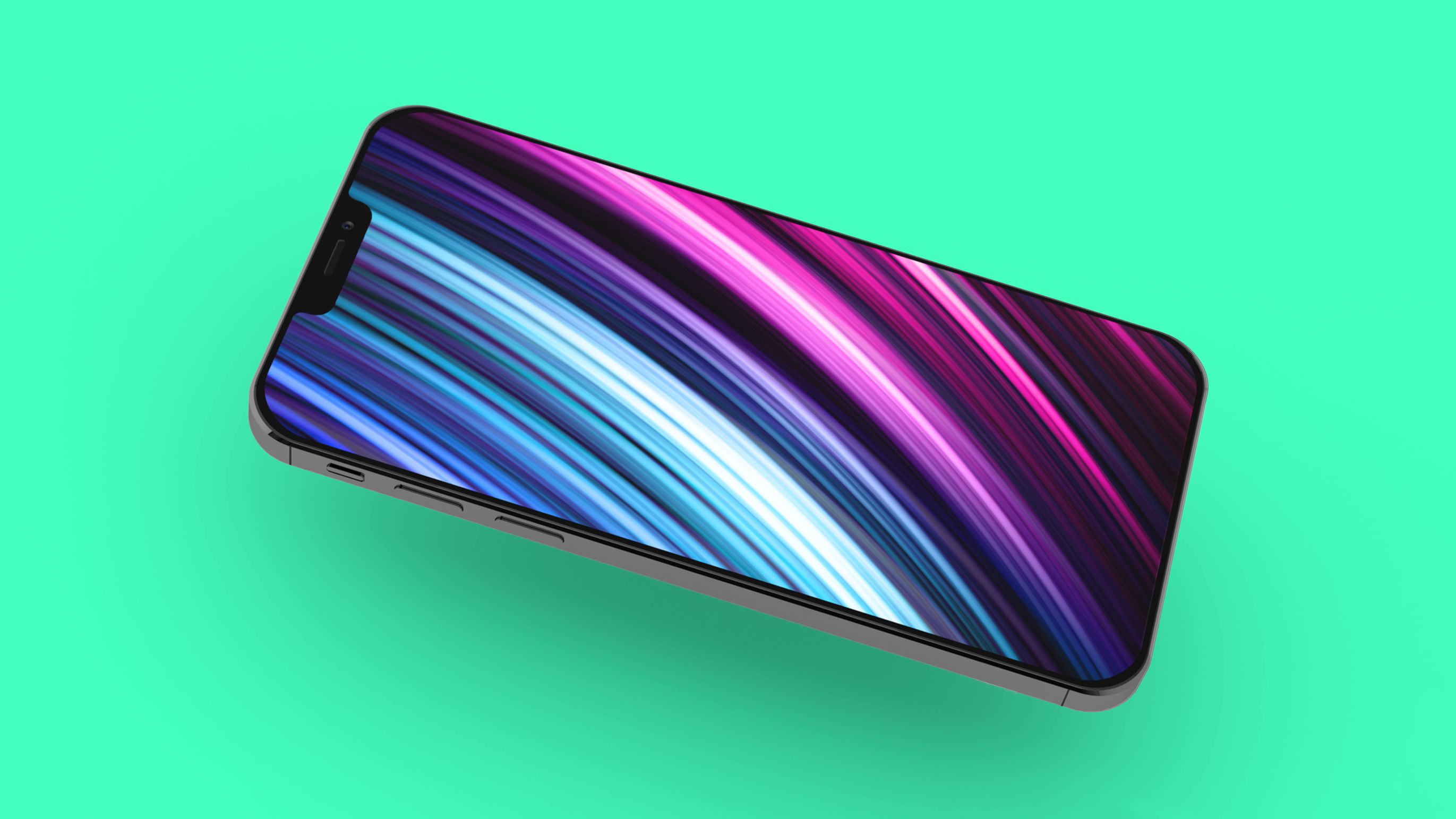- Joined
- Oct 9, 2007
- Messages
- 47,885 (7.38/day)
- Location
- Dublin, Ireland
| System Name | RBMK-1000 |
|---|---|
| Processor | AMD Ryzen 7 5700G |
| Motherboard | Gigabyte B550 AORUS Elite V2 |
| Cooling | DeepCool Gammax L240 V2 |
| Memory | 2x 16GB DDR4-3200 |
| Video Card(s) | Galax RTX 4070 Ti EX |
| Storage | Samsung 990 1TB |
| Display(s) | BenQ 1440p 60 Hz 27-inch |
| Case | Corsair Carbide 100R |
| Audio Device(s) | ASUS SupremeFX S1220A |
| Power Supply | Cooler Master MWE Gold 650W |
| Mouse | ASUS ROG Strix Impact |
| Keyboard | Gamdias Hermes E2 |
| Software | Windows 11 Pro |
Today, Intel revealed new details about Thunderbolt 4, the next generation of its universal cable connectivity solution, delivering increased minimum performance requirements, expanded capabilities and USB4 specification compliance. For the first time, Thunderbolt 4 will offer docks with up to four Thunderbolt ports and universal cables up to 2 meters in length. Intel's upcoming mobile PC processors, code-named "Tiger Lake," will be the first to integrate Thunderbolt 4. Intel also announced the Thunderbolt 4 controller 8000 series, compatible with the hundreds of millions of Thunderbolt 3 PCs and accessories already available. Thunderbolt 4 developer kits and certification testing are now available.
"Thunderbolt provides consumers with a leading connectivity standard across a range of devices, helping to advance computing experiences and delivering on the promise of USB-C with simplicity, performance and reliability. The arrival of Thunderbolt 4 underscores how Intel is advancing the PC ecosystem toward truly universal connectivity solutions," said Jason Ziller, Intel general manager of the Client Connectivity Division.

Thunderbolt products deliver a consistent, industry-leading set of capabilities for connecting computers to data, video and power with the simplicity of just one USB Type-C port. Connect to powerful Thunderbolt docks, displays, fast storage or any USB accessory for a clutter-free workspace. To ensure a consistent best-in-class experience and ease of use across a wide range of product types and manufacturers, Intel works closely with its ecosystem of computer, accessory and cable partners to employ mandatory certification for all Thunderbolt products.
"We expect Thunderbolt 4 products to be an inflection point for accessory makers who depend on PCs and Macs to offer an industry-leading set of product capabilities for a consistent user experience. The advancements in Thunderbolt 4 will help Kensington redefine the modern workspace of the future," said Ben Thacker, vice president and general manager at Kensington.
"The new capabilities and minimum requirements of Thunderbolt 4 will provide great experiences and increased productivity that our IT customers and end users require," said Jerry Paradise, vice president, Commercial Portfolio, Lenovo PC & Smart Devices. "Lenovo is excited to work with Intel to expand our support of Thunderbolt with the introduction of Thunderbolt 4 PCs and the expanding portfolio of Thunderbolt accessories."
Thunderbolt 4 builds on the innovation of Thunderbolt 3 for a truly universal cable connectivity experience. Thunderbolt 4 always delivers 40 Gbps speeds and data, video and power over a single connection. It is the most comprehensive Thunderbolt specification yet with compliance across the broadest set of industry-standard specifications - including USB4, DisplayPort and PCI Express (PCIe) - and is fully compatible with prior generations of Thunderbolt and USB products. Thunderbolt 4 certification requirements include:
View at TechPowerUp Main Site
"Thunderbolt provides consumers with a leading connectivity standard across a range of devices, helping to advance computing experiences and delivering on the promise of USB-C with simplicity, performance and reliability. The arrival of Thunderbolt 4 underscores how Intel is advancing the PC ecosystem toward truly universal connectivity solutions," said Jason Ziller, Intel general manager of the Client Connectivity Division.

Thunderbolt products deliver a consistent, industry-leading set of capabilities for connecting computers to data, video and power with the simplicity of just one USB Type-C port. Connect to powerful Thunderbolt docks, displays, fast storage or any USB accessory for a clutter-free workspace. To ensure a consistent best-in-class experience and ease of use across a wide range of product types and manufacturers, Intel works closely with its ecosystem of computer, accessory and cable partners to employ mandatory certification for all Thunderbolt products.
"We expect Thunderbolt 4 products to be an inflection point for accessory makers who depend on PCs and Macs to offer an industry-leading set of product capabilities for a consistent user experience. The advancements in Thunderbolt 4 will help Kensington redefine the modern workspace of the future," said Ben Thacker, vice president and general manager at Kensington.
"The new capabilities and minimum requirements of Thunderbolt 4 will provide great experiences and increased productivity that our IT customers and end users require," said Jerry Paradise, vice president, Commercial Portfolio, Lenovo PC & Smart Devices. "Lenovo is excited to work with Intel to expand our support of Thunderbolt with the introduction of Thunderbolt 4 PCs and the expanding portfolio of Thunderbolt accessories."
Thunderbolt 4 builds on the innovation of Thunderbolt 3 for a truly universal cable connectivity experience. Thunderbolt 4 always delivers 40 Gbps speeds and data, video and power over a single connection. It is the most comprehensive Thunderbolt specification yet with compliance across the broadest set of industry-standard specifications - including USB4, DisplayPort and PCI Express (PCIe) - and is fully compatible with prior generations of Thunderbolt and USB products. Thunderbolt 4 certification requirements include:
- Double the minimum video and data requirements of Thunderbolt 3.
- Video: Support for two 4K displays or one 8K display.
- Data: PCIe at 32 Gbps for storage speeds up to 3,000 MB/s.
- Support for docks with up to four Thunderbolt 4 ports.
- PC charging on at least one computer port.
- Wake your computer from sleep by touching the keyboard or mouse when connected to a Thunderbolt dock.
- Required Intel VT-d-based direct memory access (DMA) protection that helps prevent physical DMA attacks.
- JHL8540 and JHL8340 host controllers for computer makers.
- JHL8440 device controller for accessory makers.
View at TechPowerUp Main Site













